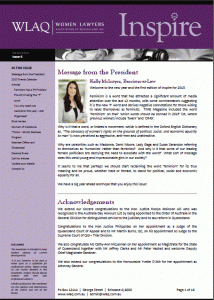Most people believe that being disorganised is just the way things are in today’s busy world. In fact, some people don’t believe that being disorganised has any impact on their life at all. The truth is, with time in short supply, it is more important than ever to be organised. Continuing to be disorganised can be costing you in more ways than you think possible.
By introducing an organised approach to key areas of your life this year, you will gain more time, reduce stress and also save money. A resolution high on everyone’s list is to get healthy. So how can being organised improve your health?
• Too much clutter attracts dust which can cause allergies and contribute to asthma, and makes your home more difficult to clean.
• Having a cluttered home can lead to high levels of anxiety, particularly if you feel too embarrassed to have friends or family over for a meal and have to rush around cleaning at the last minute.
• If your bedroom is too cluttered it will have a subliminal negative impact on your emotional health and definitely is not the restful environment you need for a good night’s sleep.
• Being organised with your meal plans and hence your grocery shopping will help you maintain a healthy eating plan and not fill up on takeaway meals.
What about your finances? This time of year is also a key time to review financial goals and deal with the aftermath of Christmas shopping….and Christmas sales. Being even just a little more organised around your finances, can save you money. Whilst I am not qualified to provide financial advice, these basic traps can cost you money if you are not organised.
• How many times have you been hit with a late fee because you misplaced a bill?
• Have you had to pay extra interest on your credit card due to a late payment?
• Have you missed out on rebates from Medicare or your health fund due to lost receipts?
• Have you returned an item to a store to be rewarded with a credit note, and now you can’t find it?
• What about coupons or Shop-A-Dockets, you collect them, especially for petrol, but when you go to the stores you have left them stuck to the fridge?
Creating systems and establishing automatic payments is a small but effective way you can start getting your finances organised.
As professional women, we are always seeking ways to secure opportunities to progress our careers and develop professionally. Being disorganised at work can have a detrimental impact on how you are perceived in the work place, and can potentially limit those opportunities. The old saying of having “a cluttered desk is a sign of a cluttered mind” still rings true for some people.
Something to think about:
• Do you think a disorganised work environment can make you look unprofessional?
• Have you been overlooked for a special assignment or project because your boss thinks you can’t handle extra work?
• If you are a manager, does your work area create an appropriate example to your subordinates?
• Have you been embarrassingly late for a meeting because you hadn’t planned what to wear (you had no fresh pantyhose, dirty shoes, button off a blouse/shirt)?
Some people can work perfectly in this environment, but the perception can be that you are incapable of managing tasks and your lack of organisation could potentially be a CLM (Career Limiting Move!)
Was one of your resolutions to create more ‘balance’ or more ‘time’ for yourself? Unfortunately we cannot adjust the amount of hours we all get each day, but are you using that time wisely?
• How much time have you wasted looking for something you know you have, but you simply can’t find? More often than not you will rush to the shops to buy a replacement, costing you even more time and money.
• Do you ‘zig-zag’ across town running errands because you haven’t organised your trip? Not only are you wasting time, again you are adding to the cost in petrol/ or cabs.
• How many times do you run to the supermarket each week because you haven’t planned your meals in advance? If you don’t have time to get to the grocery store, you will probably end up with take-away food. Refer to section on health!
• Have you been charged a cancellation fee because you missed an appointment? • What about when you are late or even missed a flight? Perhaps you didn’t get your car out of the carpark in time? These will almost certainly cost you money, not to mention add to your stress!
• Have you been late to an important meeting because you hadn’t organised the journey and got lost? Perhaps you left without knowing the correct address or didn’t have your navigator at the ready?
On a deeper level, being disorganised can be costing you emotionally. Do you recognise any of these experiences?
• Do you ever feel fatigued, stressed or simply overwhelmed when you think about your current state of organisation?
• Have you ever had a ‘tiff’ with a friend because they have loaned you a treasured item and now you are unable to find it?
• Have relationships with partners become strained when extra fees or bills are being unnecessarily paid?
• Do you feel embarrassed about the state of your home should you have drop-in guests?
• Are you a Mrs Messy married to Mr Tidy or the reverse?
• Are you consistently late when catching up with friends? If constantly repeated, being late will make your friends feel second rate; whatever was making you late was more important than them.
• Do you miss out on precious time with your family because you’re too busy chasing your tail?
As you can see, there are a lot of ways that being disorganised can affect your life and that of your family, friends and work colleagues. By addressing just one resolution this year – get organised! – you will be improving every aspect of your life. Start with one project or area you want to get organised, this will create a positive ripple effect.
9 things you can do to start getting organised today:
1. Do a time audit of your day or even a week. This will help you identify where time is being wasted and where you need to focus on organisation.
2. Put EVERYTHING into your diary – preferably an electronic diary so you have it with you at all times. Create a shared family calendar on google so everyone in your household knows where everyone is. Very handy if you need to quickly book an appointment for a family member.
3. Book regular appointments at the beginning of the year, ie annual doctors, dentist, opticians, massage, facials; anything you do regularly. For example, at the beginning of each year I schedule in my hair cuts for the next 12 months. Don’t worry about times when you might be on holiday or out of town on business, just schedule it. Should you happen to be away for an appointment you will also be reminded (because it is already in your diary, refer tip 2 above) that you need to re-schedule your haircut perhaps to before that important business trip. For medical appointments, book these to coincide with your annual health fund allowance renewals, does your fund renew your entitlements in January or July?
4. Plan ahead – take an hour or so on a Sunday afternoon to review the week (or even two weeks ahead). Have you got enough meals planned (or prepared), do the children need any special uniforms or equipment? Are any birthdays coming up that you need to buy for?
5. Put a shopping list on your fridge or inside your pantry to write down immediately items that you run out of. Shop online! Click and Collect is brilliant for shopping in the evening and collecting on your way home from work the following day.
6. Set up a home office filing system that ensures that bills are paid on time and documentation that needs to be retained has a place to go. Remember that filing is not the act of just putting stuff away, the real purpose of filing is easy retrieval when you need something – immediately!
7. Try and tackle one small de-clutter project. It could be your pantry or your medicine cabinet. Make a time each month to de-clutter another section of your home.
8. When organising your home the age old principle of putting similar items together ALWAYS applies. In the same way filing is about retrieval, organising your possessions “like-with-like” ensures easy retrieval every time. It is also a very easy organising method to teach children (and partners!)
9. What resources do you have available that you can utilise to be more organised and create time? Think about it the same way you would at work. It is not economical or commercial for you to photocopy and bind every report that needs to be sent, nor is it sensible for you to sit on reception to greet all your guests. Whilst you can do it, it doesn’t mean you should. Ask yourself ‘is this the best use of my time?’ Can I get help to do this task? Would using other resources instead of my own time improve the quality of my life (and my family, friendships, and professional outcomes)?
Think about it the same way you would at work. It is not economical or commercial for you to photocopy and bind every report that needs to be sent, nor is it sensible for you to sit on reception to greet all your guests. Whilst you can do it, it doesn’t mean you should.
Ask yourself ‘is this the best use of my time?’ Can I get help to do this task? Would using other resources instead of my own time improve the quality of my life (and my family, friendships, and professional outcomes)?


